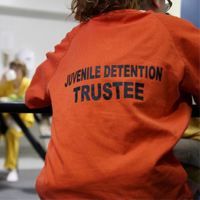
The Substance Abuse and Mental Health Services Administration (SAMHSA) and MacArthur are collaborating on an effort targeting the behavioral health needs of youth in contact with the juvenile justice system. Propelled by the success of the collaboration’s previous two-year project to divert youth with behavioral health conditions from the juvenile justice system to community-based programs and services, the new initiative will continue to advance such reform.
Most youth in contact with the juvenile justice system have either a diagnosable mental or substance use disorder. Studies have found that up to 70 percent of youth in the juvenile justice system met criteria for a mental disorder and over 60 percent of these youth also met criteria for a substance use disorder. Of those youth with mental and substance disorders, almost 30 percent experienced disorders so severe that their ability to function was highly impaired. Youth suffering from these behavioral health disorders often end up unnecessarily in the juvenile justice system rather than getting the proper help they need – help that could vastly improve their prospects for attaining healthy, productive lives.
Up to five states will be selected competitively to participate in this new initiative based on the state’s commitment to improving policies and programs for these youth. This innovative collaborative effort integrates SAMHSA’s Policy Academy mechanism, which brings together state leadership teams to learn about effective interventions and the latest research. The states' leadership teams also learn about the Foundation’s Models for Change Action Networks strategy, which supports and links teams working on similar innovations in policy and practice. This combination of resources will support state efforts to develop and implement policies and programs that divert youth, as early as possible, from the juvenile justice system.
The initiative will emphasize:
- Diverting youth with co-occurring mental and substance use disorders from the juvenile justice system
- Incorporating screening and assessment practices throughout the juvenile justice system
- Recognizing the important roles of evidence-based practice, treatment, and trauma-informed services
- Increasing collaboration among stakeholders to facilitate access to evidence-based community treatment and services
- Reducing the overrepresentation of youth of color in the juvenile justice system
"This innovative public-private collaboration will help promote strategies to ensure that fewer at-risk youth get detained in a juvenile justice system that is very often unable to address their underlying behavioral health problems," said SAMHSA Administrator Pamela S. Hyde. "This initiative focuses on getting these youth to community-based behavioral health services that can actually turn their lives around for the better."
Technical assistance will be provided to the selected states throughout the duration of this initiative to guide the establishment of models and strategies for diverting youth with behavioral health disorders as early as possible from the juvenile justice system to appropriate community based behavioral health service.
“Through the integration of SAMHSA’s and MacArthur’s demonstrated strategies for effective training and technical assistance, we will promote broader diffusion and new adaptations of best practices in systems reform,” said Laurie Garduque, MacArthur’s Director of Justice Reform. “More effective diversion policies and programs will result in improved public safety, save taxpayer money, and yield better youth and family outcomes. The states selected will have access to leading experts in the field and the latest research and information on front-end diversion policies and programs for youth with varying health needs.”
This project will be coordinated by the National Center for Mental Health and Juvenile Justice at Policy Research Associates, Inc. and the Technical Assistance Collaborative, Inc. For more information or for an application, please contact Karli Keator 866-962-6455.




